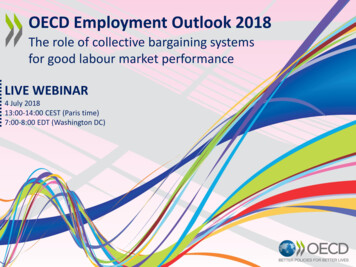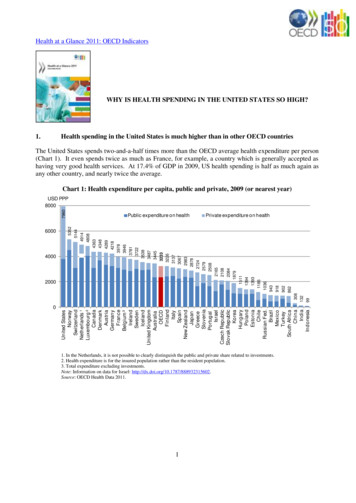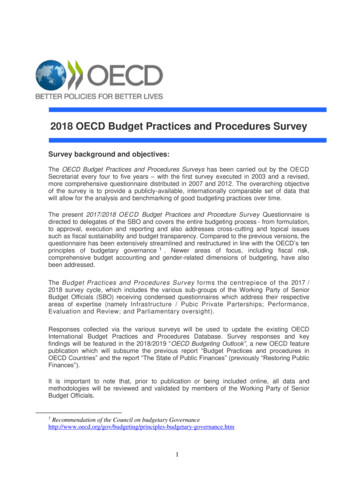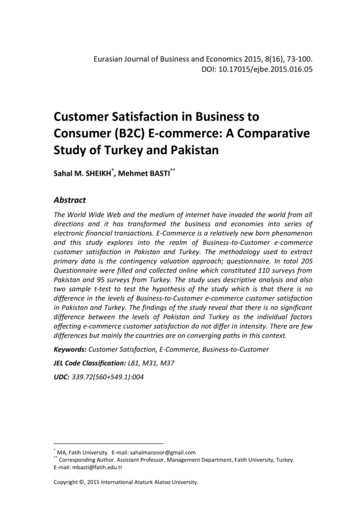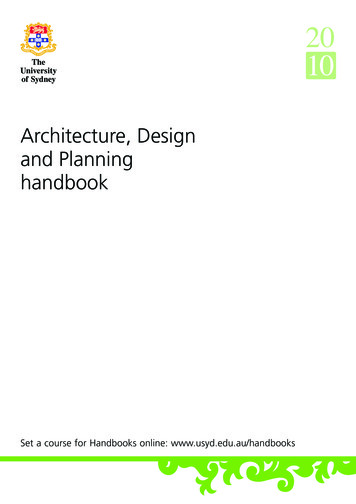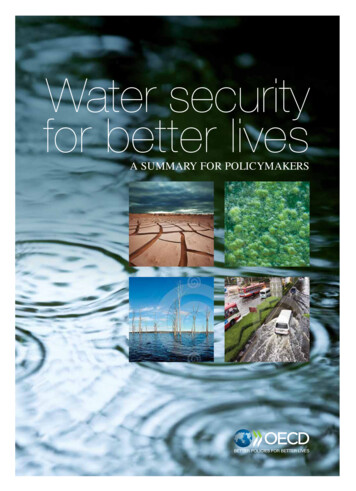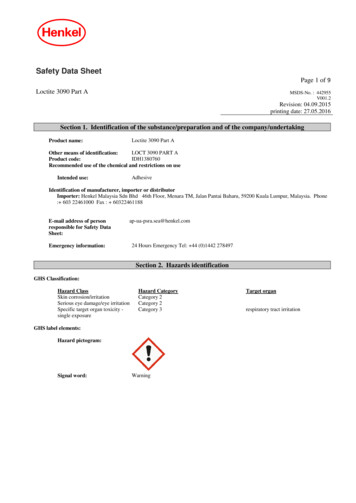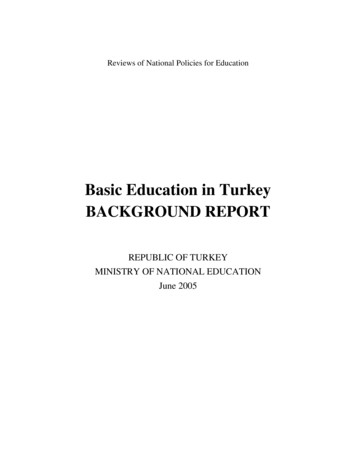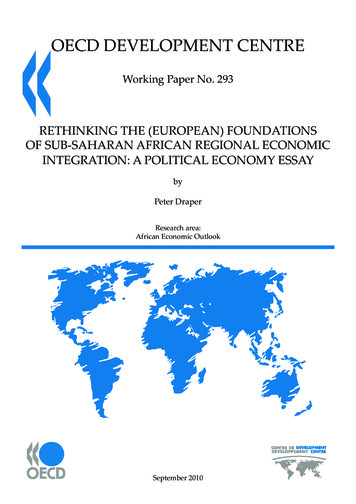
Transcription
OECD DEVELOPMENT CENTREWorking Paper No. 293RETHINKING THE (EUROPEAN) FOUNDATIONSOF SUB-SAHARAN AFRICAN REGIONAL ECONOMICINTEGRATION: A POLITICAL ECONOMY ESSAYbyPeter DraperResearch area:African Economic OutlookSeptember 2010
Rethinking the (European) Foundations of Sub-Saharan African Regional Economic Integration: A Political Economy EssayDEV/DOC(2010)10DEVELOPMENT CENTREWORKING PAPERSThis series of working papers is intended to disseminate the Development Centre’sresearch findings rapidly among specialists in the field concerned. These papers are generallyavailable in the original English or French, with a summary in the other language.Comments on this paper would be welcome and should be sent to the OECDDevelopment Centre, 2 rue André Pascal, 75775 PARIS CEDEX 16, France; or todev.contact@oecd.org. Documents may be downloaded from: http://www.oecd.org/dev/wp orobtained via e-mail (dev.contact@oecd.org).THE OPINIONS EXPRESSED AND ARGUMENTS EMPLOYED IN THIS DOCUMENT ARE THE SOLE RESPONSIBILITY OF THE AUTHORAND DO NOT NECESSARILY REFLECT THOSE OF THE OECD OR OF THE GOVERNMENTS OF ITS MEMBER COUNTRIES OECD (2010)Applications for permission to reproduce or translate all or part of this document should be sent torights@oecd.orgCENTRE DE DÉVELOPPEMENTDOCUMENTS DE TRAVAILCette série de documents de travail a pour but de diffuser rapidement auprès desspécialistes dans les domaines concernés les résultats des travaux de recherche du Centre dedéveloppement. Ces documents ne sont disponibles que dans leur langue originale, anglais oufrançais ; un résumé du document est rédigé dans l’autre langue.Tout commentaire relatif à ce document peut être adressé au Centre de développementde l’OCDE, 2 rue André Pascal, 75775 PARIS CEDEX 16, France; ou à dev.contact@oecd.org. Lesdocuments peuvent être téléchargés à partir de: http://www.oecd.org/dev/wp ou obtenus via lemél (dev.contact@oecd.org).LES IDÉES EXPRIMÉES ET LES ARGUMENTS AVANCÉS DANS CE DOCUMENT SONT CEUX DE L’AUTEUR ET NE REFLÈTENT PASNÉCESSAIREMENT CEUX DE L’OCDE OU DES GOUVERNEMENTS DE SES PAYS MEMBRES OCDE (2010)Les demandes d'autorisation de reproduction ou de traduction de tout ou partie de ce document devrontêtre envoyées à rights@oecd.org2 OECD 2010
OECD Development Centre Working Paper No. 293DEV/DOC(2010)10TABLE OF CONTENTSACKNOWLEDGEMENTS .4PREFACE .5RÉSUMÉ .6ABSTRACT .6I. INTRODUCTION.7II. AFRICAN DEVELOPMENT CHALLENGES.9III. POLITICS OF (SOUTHERN) AFRICAN ECONOMIC INTEGRATION.11IV. ECONOMICS OF (SOUTHERN) AFRICAN INTEGRATION .16V. LESSONS FROM “AFRICAN” POLITICAL ECONOMY FOR AFRICAN ECONOMICINTEGRATION .21REFERENCES .24OTHER TITLES IN THE SERIES/ AUTRES TITRES DANS LA SÉRIE .26 OECD 20103
Rethinking the (European) Foundations of Sub-Saharan African Regional Economic Integration: A Political Economy EssayDEV/DOC(2010)10ACKNOWLEDGEMENTSWe would like to thank several people who gave generously of their time to review thepaper and provide useful comments: colleagues at the OECD Development Centre, OluAjakaiye, San Bilal, Oli Brown, Alex Chandra, Gerhard Erasmus, Tobias Lenz, Mzukisi Qobo,and Mills Soko.4 OECD 2010
OECD Development Centre Working Paper No. 293DEV/DOC(2010)10PREFACEBefore the global economic crisis, Africa experienced a decade long surge in cross-borderinvestment and growth. On the occasion of a lecture at Renmin University, Beijing in China on25 August 2010, South Africa’s President Jacob Zuma pointed out, referring to the OECDPerspectives on Global Development 2010, that a decade ago OECD countries were his country’slargest trading partners. ‚Last year,‛ Zuma contrasted, ‚China became South Africa’s largesttrading partner.‛Of course, the downturn brought this surge to a halt but Africa has managed to betterweather the world’s most serious recession since the 1930s than OECD countries. Africa’sresilience is to be credited to improved macro-economic management as pointed out by the 2010edition of the African Economic Outlook.But the Outlook also ascribes this increased resilience to the increased diversity of thetrading partners of African countries over the last decade in particular. Today, both domesticfirms such as Nigerian and Moroccan banks and South African breweries, and emergingcountries such as China, are playing a prominent part in the recovery. However, formal, ‚topdown‛ regional integration processes, it seems, can claim little credit. To wit, intra-regionaltrade, their traditional focus, hovers at an estimated 10% of total African trade.In this Working Paper, Peter Draper takes stock of the last decade of African developmentfrom an African perspective. The author pleads for a recalibration of Africa’s regional integrationmodels, a process whereby ‚champion countries‛ spearhead a less ambitious, but more effectiveagenda that addresses the region’s immediate development needs.He goes on to argue that for Africa, the European model of regional economicintegration—at least in the short term — is not useful. He makes the case for limited regionaleconomic integration which steers clear of formal, institution-intensive arrangements as seems tobe the norm in sub-Saharan Africa.Our hope is that this piece triggers a constructive debate between African decisionmakers and their ‘traditional’ and ‘emerging’ partners alike.Mario PezziniDirectorOECD Development CentreSeptember 2010 OECD 20105
Rethinking the (European) Foundations of Sub-Saharan African Regional Economic Integration: A Political Economy EssayDEV/DOC(2010)10RÉSUMÉLe soutien à l’intégration économique régionale en Afrique est fort au sein des partenairesau développement du continent et des élites africaines. Cependant, une intégration régionale àl’Européenne ne correspond pas aux capacités régionales, et dans certains cas, pourrait faire plusde mal que de bien. Cette lacune est exacerbée par les analyses techniques et théoriques baséessur les littératures de l’économie et des relations internationales. Cet article vise àreconceptualiser les fondations de l’intégration économique africaine en passant en revue lesprincipaux débats au sein de chaque littérature, et en comparant les résultats de manièrepluridisciplinaire. Globalement, nous concluons qu’une approche bien plus limitée est requise :mettre l’accent sur la facilitation du commerce et la coopération en matière de régulation dansdes domaines relevant en premier lieu des affaires, dans le cadre d’un régime de sécurité quirenforce la bonne gouvernance au niveau national. Une attention particulière devrait être portéeà la conception des programmes, de telle sorte qu’ils n’aggravent pas les problèmes de capacitéet de mise en oeuvre qu’on rencontre dans l’édification d’Etats viables et légitimes. Ce faisant, laprésence de leaders régionaux au poids économique important – l’Afrique du Sud dans le cas del’Afrique australe – indique l’impératif d’une construction de ces accords économiques régionauxautour d’Etats stratégiques.Classification JEL: F150Mots clés: intégration; organisations du commerce international; intégration économique.ABSTRACTSupport for regional economic integration in Africa runs high amongst the continent’sinternational development partners and African elites. However, its expression in Europeanforms of economic integration is not appropriate to regional capacities and in some cases may domore harm than good. This lacuna is exacerbated by technical and theoretical analyses rootedeither in economics or international relations literatures. This paper sets out to reconceptualisethe foundations of African economic integration through reviewing key debates within eachliterature and comparing the results across disciplinary boundaries. Overall, I conclude that amuch more limited approach is required, one that prioritises trade facilitation and regulatorycooperation in areas related primarily to the conduct of business; underpinned by a securityregime emphasising the good governance agenda at the domestic level. Care should be taken todesign the ensuing schemes in such a way as to avoid contributing to major implementation andcapacity challenges in establishing viable and legitimate states. In doing so, the presence ofregional leaders with relatively deep pockets– South Africa in the Southern African case – pointsto the imperative of building such limited regional economic arrangements around key states.JEL Classification: F150Keywords: integration ; international trade associations ; economic integration6 OECD 2010
OECD Development Centre Working Paper No. 293DEV/DOC(2010)10I. INTRODUCTIONThe desire to integrate African economies on a regional, and ultimately continental, basisis strong. It is shared amongst African elites and their international development partners.Consequently many formal initiatives have been established to further this goal, under the overarching umbrella of the African Union’s plan to achieve a continental common market by 2028.However, often the rhetoric does not match the reality. African economic integrationsuffers from a litany of problems, ranging from overlapping memberships (Dinka and Kennes,2007; Draper et al, 2007; UNECA 2006 and 2008), through unfulfilled commitments, to unrealisticgoals. Therefore, it is appropriate to reconsider the conceptual foundations on which suchintegration is based, and in particular their strong European roots. This is not to suggest thatEuropeans are somehow ‘imposing’ their model of regional economic integration on Africa, forexample by pre-selecting African groupings with which to negotiate Economic PartnershipAgreements. That is a charge which is often heard in civil society quarters, but to establish itempirically would require a different essay. Rather, my focus on Europe draws its inspirationfrom the dominance of Europe in sub-Saharan African thinking concerning regional economicintegration. Again, this is not to suggest that Africans cannot learn from other models such asAsian; rather my focus is ‘narrowly’ on European influence on (Southern) African normsconcerning regional economic integration.The influence of the European model on (Southern) African thinking is discernible in atleast two areas: political and institutional. At the political level, the underlying rationale is rootedin the ‘liberal peace hypothesis’, which asserts that closer economic integration constitutes ‘tiesthat bind’ which act to restrain member states from engaging in hostile military actions againsteach other. We explore this more deeply in Section III and show that it has limited applicabilityto (Southern) Africa. At the institutional level African regional economic communities (RECs)tend to mimic European Union forms, particularly in their predilection for Customs Unions.My purpose in putting forward this analysis is not to engage in ‚Euro-bashing‛; rather itis to as dispassionately as possible promote the need for alternative thinking on optimal designof RECs in (Southern) Africa. My approach to doing so is to explore the extensive literatures onregional economic integration emanating from two broad paradigms: security and economic. Toomuch writing on the subject is rooted in one or the other approach, which necessarily limits theapplicability of conclusions reached. Therefore, it is necessary to explore motivations from bothspheres in order to gain a holistic understanding of the possibilities and constraints. My papersets out to redress this deficit by explicitly considering the political economy of African economicintegration and proffering broad proposals for the normative foundations on which attendant OECD 20107
Rethinking the (European) Foundations of Sub-Saharan African Regional Economic Integration: A Political Economy EssayDEV/DOC(2010)10schemes should be built. My reference point is the region I know best and which I inhabit:Southern Africa.The paper is divided into four parts. In Section II, I briefly outline key contours of ‚the‛African development challenge, charting familiar territory for all those versed in the issue. Theframework for this assessment is Paul Collier’s (2007) influential ‚Bottom Billion‛ concept. Theessential point is that the challenges are vast, whereas the means to address them confrontenormous constraints. This sets the scene for a discussion of the politics of regional economicintegration in Section III, which is cast in terms of the ‚liberal peace‛ paradigm derived from theEuropean Union (EU) example. The rationale for this paradigm is explained and its applicabilityto African political conditions discussed. The basic conclusion reached is that the paradigm haslimited ideological applicability to African conditions, whereas its institutional requirements aretoo onerous. This points to the need for more limited ambitions in the African context. Thismessage is reinforced in Section IV where insights from economic theory concerning regionaleconomic integration amongst poor countries are offered. Section V concludes with a set ofpropositions gleaned from the preceding analysis, whereby the case for less ambition inconstructing African regional economic integration arrangements is framed and my appeal toconsider an alternative approach is grounded.8 OECD 2010
OECD Development Centre Working Paper No. 293DEV/DOC(2010)10II. AFRICAN DEVELOPMENT CHALLENGESSub-Saharan Africa contains a high concentration of least developed countries (LDCs); inthe Southern African case 71 out of the global total of 49. Partly this is a function of politicalprocesses, discussed in Section III. Substantially it is a function of small domestic economies thatare largely rural, subsistence-based, significantly informal, with weak productive capacitiesconcentrated in extractive industries, and huge infrastructure or ‚supply-side‛ deficits thatinhibit integration into the global economy. This picture is the basis for gloomier assessments ofAfrican development prospects, characterised as ‚development traps‛. Collier (2007, 7) seesthese problems as being particularly concentrated in Africa, with 70% of the ‚bottom billion‛being African, and living in countries that have been or are in one or another of these ‚traps‛. InCollier’s formulation there are four such ‚traps‛ in which the countries he classifies as ‚thebottom billion‛2 are wedged:1. The conflict trap. Essentially, wars and coups keep countries from growing andhence dependent on primary commodities. But because they are poor, stagnant,and dependent on primary commodities they remain prone to wars and coups(Collier, 2007, 37). In Southern Africa two countries have relatively recentlyemerged from prolonged conflict (Angola; Mozambique) whilst a third hasmanaged to avoid overt conflict at the expense of chronic political and economicinstability (Zimbabwe).2. The natural resources trap. Resource rents make democracy malfunction byunleashing patronage politics in societies lacking sufficient restraints on suchbehaviour owing to pervasive institutional weaknesses. In his view this closes offeconomic development possibilities (Collier, 2007, ch3). Incidentally, he views thistrap as not being confined to the ‚bottom billion‛, but also affecting middleincome countries which stagnate at that level. In Southern Africa three countriesseem to have evaded this trap (Botswana; South Africa); others seem mired in it(Malawi; Zambia; Zimbabwe).3. The trap of being landlocked with bad neighbours. Poor landlocked countriesdepend on their neighbours not just for their economic infrastructure and accessto the sea, but also as export markets (in Southern Africa this includes a number ofstates: Lesotho; Swaziland; Botswana; Zimbabwe; Malawi; Zambia). Ironically, theproblem is worse for resource-scarce countries (e.g. Lesotho) as they face1These are Angola, Lesotho, Malawi, Mozambique, Madagascar, Tanzania and Zambia.2The term refers to the combined population of countries on the lowest rung of the economic development ladder; inCollier’s formulation these are concentrated in Africa and Central Asia (Collier, 2007, 3). OECD 20109
Rethinking the (European) Foundations of Sub-Saharan African Regional Economic Integration: A Political Economy EssayDEV/DOC(2010)10additional hurdles to development of infrastructure even if for resource extraction(Collier, 2007, ch4). These problems are compounded by agglomeration ofeconomic activity in coastal locations (South Africa) with their easier access toglobal markets (World Bank, 2000, 51-61), a point I return to in Section IV.4. The bad governance trap. Countries in the bottom billion that also have badgovernance and bad policies are most likely to end up as ‚failed states‛, in whichreform initiatives are quickly overwhelmed by those who benefit from disorder(Collier, 2007, ch5). However, he qualifies this by arguing that even goodgovernance and good policies cannot propel a country into rapid growth if it doesnot have opportunities to grow.In Collier’s view it is possible for countries to break free of these traps, but he sees thecurrent global economic environment characterised by China and East Asia’s manufacturingdominance as being much more hostile to new entrants now than in the past; hence breaking freeand sustaining the path is, in his view, much more difficult. Clearly this constraint has beenrendered even more challenging as the global financial crisis continues to unfold.Collier’s thesis concerning development traps essentially asserts that the onus forunderdevelopment lies outside of the country concerned in circumstances beyond theinhabitants’ control (after all they are ‚trapped‛) and therefore seals the case for externalsubsidies or ‚development assistance‛ and trade preferences. The trade preference argument fitswith the role of hegemons in underwriting liberal international regimes, which I discuss inSection III. The development assistance prescription is the subject of heated debate. Given theimportance of this issue in the African context, and since I have outlined Collier’s broad case infavour of it, it is worth quoting a counterview expressed by Bauer (2000, 44) in detail:Throughout the world and throughout history, countless individuals, families,groups, communities, and countries have emerged from poverty to prosperitywithout donations and often did so within a few years or decades .Thehypothesis is also disproved by the existence of developed countries, all of whichstarted poor and developed without subsidies. If external subsidies wereindispensable for economic advance, mankind would still be living in the OldStone Age.By this logic development is fundamentally a domestic affair. This highlights the role thestate should play in development processes - which is a matter of longstanding academic andpolicy debate. For now it is important to note that the development challenges which SouthernAfrica in particular faces are serious, so it is scarcely surprising that regional economicintegration should be widely seen to offer part of the solution to addressing them. Next I addressthe politics of (Southern) African economic integration; Section IV focuses on the economics.10 OECD 2010
OECD Development Centre Working Paper No. 293DEV/DOC(2010)10III. POLITICS OF (SOUTHERN) AFRICAN ECONOMIC INTEGRATIONThe political case for building regional economic integration is centred primarily onsecurity considerations. The reference point is principally European, specifically the origins ofthe European Community centred on managing Franco-German relations in order to avoid arerun of the first and second World Wars. Their subsequent construction of an elaborateEuropean institutional edifice aimed to enmesh its constituent states into a web of economicrelations or ‚regimes‛.3 Within this progressively deeper economic integration was an essentialelement, with the central objectives being to manage resource competition amongst theconstituent states and promote mutual wealth creation, which in turn required curtailment (notnecessarily abandonment) of mercantilist thinking regarding management of internationaleconomic relations (Draper et al, 2006, 213). The establishment of democratic governance inGermany was also an essential prerequisite. Thus the European regional integration regime wasconstructed on the basis of three ideological foundations (Kelly, 2005, 75-77) designed to promotepacification: democracy or ‚Republican Liberalism‛; commerce and trade or ‚CommercialLiberalism‛; and institutions or ‚Regulatory liberalism‛. At the global level the GeneralAgreement on Tariffs and Trade (GATT) was constructed on similar ideological foundations,with a core of Western democracies driving the agenda.The role of strong states (the US in the GATT; France and Germany in the EU) wasessential to the success of both regimes. This gave rise to the theory of hegemonic stability(Gilpin, 2000, 93-97) which posits that a hegemon is central to maintaining adherence to liberalinternational economic regimes, and by extension liberal peace, through underwriting the costsof maintaining the regime (e.g. by providing access to its own market) rather than coercion. Butin both regimes member states retained domestic ‚policy space‛4 so that the overall enterpriseconstituted what John Ruggie (1982) termed an ‚embedded liberalism‛ compromise. In otherwords, both regimes remained fundamentally intergovernmental rather than supranational, thevariable institutional forms being determined by sovereign nation states taking the lead incomplex interactions with domestic interests (Gilpin, 2000, 357). In the EU’s case this has meant agreater degree of supranationality, particularly with respect to regulation of the common market.3In terms of which member states are prepared to construct collective norms and regulations in order to facilitatecompatibility amongst themselves and prevent individual states from engaging in actions destructive of economicactivity, in the interests of maintaining (regional) peace. These norms and regulations constitute what Keohane(1984) termed an international ‚regime‛, which he regarded as essential to preserve and stabilise the internationaleconomy.4The Europeans in order to construct domestic welfare states; the US Congress in order to retain autonomy over UStrade policy. OECD 201011
Rethinking the (European) Foundations of Sub-Saharan African Regional Economic Integration: A Political Economy EssayDEV/DOC(2010)10The constituent states, primarily the developed world, retained a strongly state-centredperspective to varying extents premised on ‚Economic realism‛ notions, in terms of which thesurvival of the state is the central concern. Kelly (2005, 74-75) notes that concerning trade thisencompasses two views: that trade can enhance or undermine the security of the state. The latterperspective leads to a desire to promote economic autarky in order to minimise dependence onforeign powers. This reinforces the point that whilst it is necessary to yield some sovereignty inorder to maintain the international regime as a public good, there would always be tensionsregarding how much sovereignty to yield (Kelly, 2005, 76) and therefore a presumption in favourof inter-governmentalism. Furthermore, the view that trade can enhance state security is built onmercantilist notions, in terms of which the economy is the foundation for national power andstates deploy trade (and other) instruments to accumulate economic gains at their rivals expensein order to keep them in check. This resonates with ‚strategic trade theory‛, the essence of whichis that industries which experience oligopolistic market structures, increasing returns to scaleand cumulative knowledge processes can benefit from state support to enhance their share ofglobal markets at the expense of their rivals. In this view trade is a zero-sum game, a view atodds with the beneficial expansion of international trade in the post World War Two period –associated as it was with far-reaching trade liberalisation in the developed world particularly.The European Union’s success in managing inter-state conflict, understandably, isproffered to developing countries. This is particularly influential in the African context owing tothat region’s historical and existing links to Europe via trade, investment, and developmentassistance. Yet as discussed in Section IV the economics of integration amongst developingcountries is not obviously conducive to maintaining good relations amongst the statesconcerned, particularly if it leads to polarised development. Furthermore, there are someexamples of members of developing country regional economic groupings resorting to armedconflict to settle their differences (Brown et al, 2009, 9) thus proving that regional economicintegration does not automatically eliminate conflict.Nonetheless, Hammerstad (2005) notes that in recent years there has been a global revivalof interest in the role RECs can play in building security. This has been marked by a shift fromtraditional realist conceptions in which security of the state, and amongst states, are the keyissues, to one centred on people where domestic governance is the pivotal concern. This shift wasdriven by the end of the Cold War with its myriad of proxy conflicts, to a world where internalfragmentation and state failures have moved to the forefront.5 The logical regional corollary isthat states are increasingly concerned with security risks generated by their neighbours arisingfrom poor governance leading to cross-border instability. Therefore, in her view regional securitycommunities in Africa are increasingly willing to replace ‚hard sovereignty‛. In terms of whichinterference in other member states’ affairs is expressly forbidden, with regimes that allow forforeign intervention under defined circumstances (Hammerstad, 2005, 10). 65In Africa in the 1990s and in this decade inter and intra-state conflicts broke out in West Africa (Liberia, SierraLeone, Cote d’Ivoire), Central Africa (the DRC, Rwanda, Burundi, and Uganda, involving also Angola, Zimbabweand Namibia), and the horn of Africa (Somalia, Ethiopia and Eritrea).6The Kenyan then Zimbabwean political deals reached in 2008 and 2009 respectively, imperfect as they are, attest tothis new paradigm.12 OECD 2010
OECD Development Centre Working Paper No. 293DEV/DOC(2010)10Clapham (2001) agrees that establishing such structures at the regional level is essential toconstructing a broader ‚good governance‛ agenda, which in turn provides the basicprecondition for enabling economic growth. However, he argues (Clapham 2001, 64) thatestablishing such structures require that the constituent states share a ‚common idea of thestate‛7, in other words ideological congruity, by which he refers to the liberal foundations of theEuropean experience. He argues that failure to do so will seed conflict. Since these conditions aredifficult to meet in the African context he asserts that the ‚liberal peace‛ paradigm representedby the European Union is a very challenging proposition for African states (Clapham 2001, 66), aview largely supported by the economic literature analysis in Section IV. Clapham’s pessimism isrooted in the host of governance challenges African states confront. Furthermore, the currentcharacter of many post-colonial African states does not obviously lend itself to constructing a‚liberal peace‛; many are managed by former liberation movements or authoritarian, effectivelysingle party governments.8 Of course if a small core of relatively democratic ‘liberal’ states with aregional hegemon at the centre was able to construct a viable REC then potentially this could beexpanded to include others; the recent expansions of the EU to include former communist statesmay offer some hope in this regard. However, this scenario seems unlikely in the short tomedium term.In this light it is important to contextualise the debate over the role of African states in thedevelopment of their countries and the associated ‚good governance‛ agenda. The danger ofembarking on discussions of this kind is that we run the twin risks of engaging in ‚Afropessimism‛, which at worst is akin to racism connected with alleged continued imperialdomination (Adebajo, 2009); or indulging in what Mkandawire (2001) terms the ‚impossibilitythesis‛ by which he identifies an implicit view in the ‚good governance‛ agenda that Africanstates are serially incapable of managing their own affairs owing to the nature of African politics,and therefore should not attempt to construct ‚developmental states‛ in the mode of East Asianmodels. Therefore it is important to take account of Mkandawire’s (2001) argument that thetrouble with the ‚good governance‛ paradigm is that it comes embedded in ‚neoliberal‛ policyprescriptions in terms of which Africa
On the occasion of a lecture at Renmin University, Beijing in China on 25 August 2010, South Africa's President Jacob Zuma pointed out, referring to the OECD . trading partner.‛ Of course, the downturn brought this surge to a halt but Africa has managed to better . des domaines relevant en premier lieu des affaires, dans le cadre d'un .

